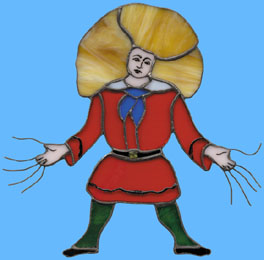Reply
Wed 3 Sep, 2003 11:46 am
I am trying to find a link to images of a traditional German children's book.
The first problem is that I don't remember the exact name of the book. I think it's "Schrubelpeter" or "Schnabelpeter".
It is on verse. The children in the book are quite dissobedient and get incredibly cruel punishments (like having their hands cut off for not cutting their nails). The images of the book -which are an essencial part of it- are quite telling of a certain type of upbringing.
A friend of mine was brought up with this nightmarish stuff (it scared when he showed the book to me, and I was 16), but I lost contect with him.
Could you please help me find those links?
I knew you would rescue me, Walter!. Thanks.
On the second link, you'll find in the lower section ALL original pictures (Bilder)!
Great links, indeed. The pics are fantastic.
The story of the girl who plays with matches is absolutely terrifying!
...and the boy didn't have long nails, but sucked his thumbs.
Did you read Struwwelpeter as a child, Walter?
Any German child had to read it, "Suppenkaspar" was the one, they always read me out (= I had to hear it over and over again: don't know, why :wink: ).
BTW: Struwwelpeter the only book I know, which today still looks like the original print.
fbaezer, here are some links from
Amazon.com including an
English translation if you're interested. The English translation has several sample pages which include illustrations.
Ah, I see Walter has already beat me to it. Well, now you have a source to purchase it if you wish.

Butrflynet wrote:fbaezer, here are some links from
Amazon.com including an
English translation if you're interested. The English translation has several sample pages which include illustrations.
Seems to be the same as the online edition, only less pages :wink:
I did not like those cruel Hoffmann stories. Especially "The Story of Little Suck-a-Thumb"(Die Geschichte vom Daumenlutscher).



Now, ain't this eeriely cool?!
Oh my! I and my sister were raised on the English version! I should have realised it was translated from the German, once I knew a little German, because of the structure and rhythm of the verse!
"Snip snap snip the scissors go,
And Conrad cries out: "Oh! Oh! Oh!"
I see poor Matilda burning like a veritable bush up there....
Well, she was Matilda in our book - but the cats were not there...
This is the version translated by my best friend's father. He goes to Germany annually to speak at a Hoffman conference.

kind of funny knowing a Scottish/Irish/Canadian math professor who does translations of German children's torments, when he's not tricking people into thinking they can play the bagpipes.

Don't forget Max und Moritz.
Nasty little buggers.
Well, the katzenjammer kids aren't THAT nice either :wink:
Actually I liked the crassness of the book as a kid. Having reread it now, I still do. I also like how the book addresses some pretty serious and modern topics such as cruelty to animals, abusive relationships, anorexia, and racism. It's nice to see a children's book that doesn't try to pack children's little souls in cotton batting. They're tougher than we think, and it's good to see them addressed that way.
Yeah - rip their bloody arms off!
It is funny - specializing as I do in attachment and early disturbances thereof, and hence spending lots of time discussing matters relating to infants - how often a hint of sadism enters songs and stories re children. Many lullabies, eg, hint at horrors befalling the baby one is attempting to lull - "down will come cradle, baby and all".
We were wondering if these reflect the ambivalence of parenting - the love, and the deep frustration and fury with the child who will not sleep; the sweetness, and the feeling of being consumed by the needs of the child. Hmmmmmmm?
Although I'm "officially" against bowdlerizing of children stories, I disagree with Thomas about Struwwelpeter's pedagogical sense.
The only message is: you behave badly, you will be harshly punished.
There is no attempt to understand why something is wrong. Behave well and by doing so you will avoid terrible consequences. Raw discipline with a dash of cruelty.
Racism? Anorexia? Come on!
Look at the images.
"Die Geschichte von den schwarzen Buben" tells you: if you laugh at inferior races, such as the "kohlpechrabenschwarzer Mohr", you will become one of them. A strange way of adressing racism.
"Die Geschichte vom Suppen-Kaspar" is not about anorexia, but about "eating and drinking as you are told" and not having tantrums.
On a lighter side, how would Struwwelpeter address other children stories?
I imagine the three bears would have eaten Goldilocks and repaired Baby Bear's chair using the girl's bones and golden locks instead of wood and hay.